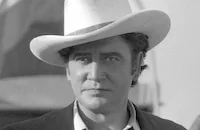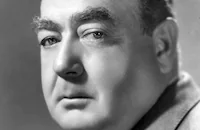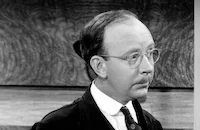The Kansan

Brief Synopsis
Cast & Crew
George Archainbaud
Richard Dix
Jane Wyatt
Albert Dekker
Eugene Pallette
Victor Jory
Film Details
Technical Specs

Synopsis
In the late 1800s, Broken Lance, Kansas, is put on the map by the advent of the Kansas-Pacific railroad. When the James gang terrorizes the town, sharpshooter John Bonniwell, a Civil War veteran and gold miner en route to Oregon, kills three out of the four members, and saves the bank from being robbed. John's gunshot wounds land him in the hospital, but bank president Steve Barat, who controls the town, pays the hospital bills and nominates John to be the new marshal. John realizes that this means that he will be working for Steve's interests, but decides to stay on as marshal after he meets beautiful Eleanor Sager, the proprietor of the town's hotel. The next day, Steve's honest but shiftless brother Jeff shows John around Broken Lance, and they inadvertently encounter trouble when Texas rancher Tom Waggoner tries to herd his cattle across Steve's land without paying the exorbitant passage fee. Tom, a long-time friend of John, disapproves of Steve's robber baron tactics, but accepts John's advice to camp overnight while John discusses the matter with Steve. Steve stands by his right to charge a toll, but when Tom's herd stampedes uncontrollably across Steve's property, John refuses to arrest him. When the Hatton gang comes into town, John confronts them for murdering his brother. After a brawl erupts, John arrests the Hattons, but the next morning, he learns that Steve has released the gang on bail and that they have murdered Tom. John's vocal opposition to Steve earns the banker's enmity, and Steve now hopes to discredit John. When Jeff asks Steve for a loan, Steve convinces him to rob the bank and keep the proceeds. After Jeff gets the money, he goes to Eleanor's hotel, but John follows him there and confronts him. Seeing that Jeff is pointing a hidden gun at John, Eleanor provides Jeff, who has been courting her, with an alibi so that John will leave. Jeff is disappointed, however, when Eleanor later professes her love for John, and out of sincere love for Eleanor, he turns the money over to John, thereby foiling his brother's plan. When Steve sends the Hatton gang to kill John while he is out riding with Eleanor, Jeff warns them in time and uses himself as a decoy for the gang. Jeff and Eleanor's hotel caretaker, Bones, are then abducted by the gang, while John returns to town and finds that Steve is using a legal technicality to seize property from ranchers. John turns the tables and arrests Steve on the basis of a telegram from New York authorities, which states that Steve was indicted in New York for grand larceny but fled before his arrest. The Hatton gang plans to overtake the town and follows Jeff's advice to take the short route over Steve's toll bridge. Jeff then sends Bones, who has escaped from the gang, to run to town and warn John to dynamite the bridge. John and a posse set up the dynamite, and when they fail to scare the Hattons with a gunfight, they discharge the explosive, killing Jeff as well as many gang members. A posse led by John then intercepts the rest of the gang, and after a fierce battle, the townspeople reclaim Broken Lance from the outlaws. Once again, John must recuperate from his gunshot wounds in the hospital, and when he hears a band playing music outside, Eleanor explains that they are celebrating her engagement to him.

Director
George Archainbaud
Cast

Richard Dix

Jane Wyatt

Albert Dekker

Eugene Pallette

Victor Jory

Robert Armstrong
Beryl Wallace

Clem Bevans

Hobart Cavanaugh
Francis Mcdonald

Willie Best

Douglas Fowley
Rod Cameron
Eddy Waller
Raphael Bennett
Eleanor Counts
Olivia Steele
Lorraine Clark
Barbara Clark
Beatrice Gray
Sylvia Mckay
June Earle
Sam Flint

Byron Foulger
Jack Norton
Russell Simpson
Crew
Ralph Berger
Gerard Carbonara
Foster Carling
Glenn Cook
Russell Harlan
Emile Kuri
Louis Lambert
Carrol Lewis
Earl Moser
Jack Noyes
Phil Ohman
Eddie Prinz
Lewis J. Rachmil
Sherman Rose
Harry Sherman
Harold Shumate
Irvin Talbot

Videos
Movie Clip


Hosted Intro
Film Details
Technical Specs

Award Nominations
Best Score
Articles
The Kansan
Following his screen debut in 1917, Dix quickly earned a contract at Paramount and made a number of successful pictures there, including Cecil B. DeMille's biblical epic The Ten Commandments (1923). He moved to RKO late in the decade, where he became a major Western star, a status solidified by his Oscar®-nominated performance in the big-budget Western Cimarron (1931). By the beginning of the 1940s, he was appearing almost exclusively on horseback until he took on various roles in Columbia's "Whistler" series, seven pictures in all between 1944 and 1947. He retired after the last of these, The Thirteenth Hour (1947). In 1949 at the age of 56, he suffered a serious heart attack on board a train from New York to Los Angeles and died eight days later.
The Kansan, filmed under the working title Meet John Bonniwell, had the advantage of a strong supporting cast, including Jane Wyatt (she was famous in the 1950s as the mom on Father's Knows Best) and several top character actors of the era: Albert Dekker, Eugene Pallette, Victor Jory, and Robert Armstrong, one of the stars of King Kong (1933). It was also lauded for its numerous and exciting action sequences and shoot-outs, making it, in the words of a New York Times review, "the kind of Western in which the cast decreases almost as rapidly as a pay check on Saturday night." But its real mark of distinction comes from its score, which earned an Academy Award nomination for composer Gerard Carbonara, whose credits include a great many Westerns, a few Bulldog Drummond mysteries, and the 1949 version of F. Scott Fitzgerald's The Great Gatsby.
Carbonara was not responsible for the one song heard in the film, "Lullaby of the Herd," by Foster Carling and Phil Ohman. The number is performed by the King's Men, a quartet that first gained national prominence on the radio as a feature of the Paul Whiteman Orchestra. The group's arranger and bass vocalist, Ken Darby, was hired as vocal arranger on the production of The Wizard of Oz (1939) after leaving Whiteman. Members of the King's Men can be heard in the Munchkin sequence as the mayor, coroner, and Lollipop Guild. Darby went on to win three Academy Awards for scoring The King and I (1956, an honor he shared with Alfred Newman), Porgy and Bess (1959, a shared win with Andre Previn), and Camelot (1967, also shared with Newman).
The Kansan also features the voluptuous Beryl Wallace, a popular nightclub and stage performer who made several movies between 1934 and 1944. She was the lover and protégé of producer Earl Carroll, whose "Vanities" came close to rivaling Florenz Ziegfeld's "Follies," if not in lavishness then certainly in its promotion of beautiful showgirls. In fact, according to a Hollywood Reporter news item, several of the women portraying dance hall girls in The Kansan were Follies performers. Wallace put in many hours and many miles entertaining troops during World War II. She was only 35 when she and Carroll, along with more than 40 others, were killed when their New York-to-Los Angeles plane crashed in Pennsylvania.
Cinematographer Russell Harlan had been laboring primarily in Western programmers up to this point in his career. He later went on to receive six Academy Award nominations for his work, including Blackboard Jungle (1955) and To Kill a Mockingbird (1962).
Although glimpsed only briefly, one of the gang members robbing the bank, presumably Jesse James himself, is played by future Superman George Reeves.
The script, by frequent Western writer Harold Shumate, was based on the 1939 story "Peace Marshal" by Frank Gruber, one of the most prolific and successful of all pulp fiction writers. Gruber wrote many Western stories and novels, as well as mysteries and adventure stories. He also wrote a number of screenplays as well as scripts for episodes of various television series. The film is also known as Wagon Wheels in the United Kingdom.
Director: George Archainbaud
Producer: Harry Sherman
Screenplay: Harold Shumate, based on the story "Peace Marshal" by Frank Gruber
Cinematography: Russell Harlan
Editing: Carrol Lewis, Sherman A. Rose (uncredited)
Art Direction: Ralph Berger
Original Music: Gerard Carbonara
Cast: Richard Dix (John Bonniwell), Jane Wyatt (Eleanor Sager), Albert Dekker (Steve Barat), Eugene Pallette (Tom Waggoner), Beryl Wallace (Soubrette).
BW-79m.
by Rob Nixon

The Kansan
Quotes
Trivia
Notes
The working title of this film was Meet John Bonniwell. According to a Hollywood Reporter news item, Beryl Wallace was a star in the Earl Carroll variety shows, and the rest of the actresses portraying "Dance hall girls," including Eleanor Counts, Olivia Steele, Lorraine Clark, Barbara Clark, Beatrice Gray, Sylvia McKay and June Earle, were Ziegfeld Follies performers. Although the notorious James gang is referred to in the film, neither Jesse James nor his brother Frank are individually portrayed. A modern source includes Merrill McCormack and Jack Mulhall in the cast. Gerard Carbonara was nominated for an Academy Award for Best Music (Scoring of a Dramatic or Comedy Picture) for this film.















